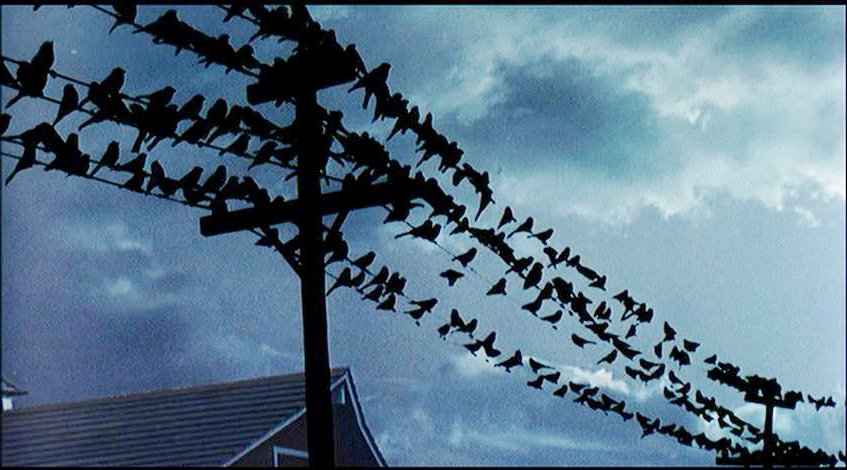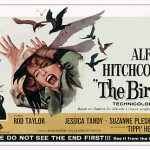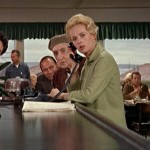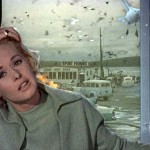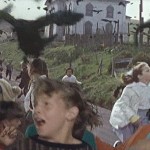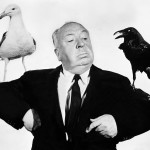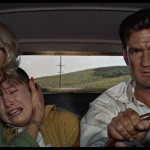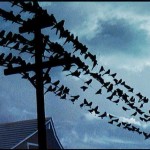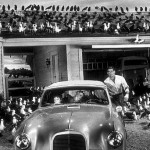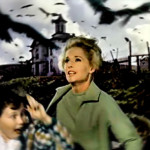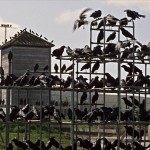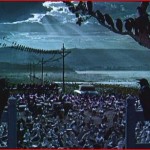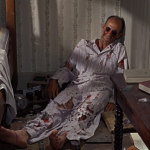Hitchcock loved to defy convention and expectations. He also loved technical innovation in equal measure. However, many accounts indicate that not only did he not love actors, he regarded them as a necessary evil, to be manipulated to the point where their reactions display genuine fear rather than merely acting. Of course, he did have a thing for blondes, even if they were bewigged blondes, but that was largely his fantasy world playing out, and how many of us have a chance to do that and get paid for it?
All of Hitch’s virtues and vices are on display in The Birds, with technical virtuosity to the fore and maltreatment of the unfortunate Tippi Hedren following not far behind. From Wikipedia:
Hedren recalled the week she did the final attack scene in a second-floor bedroom as the worst of her life. Before filming it, she asked Hitchcock about her character’s motivations to go upstairs and his response was, “Because I tell you to.” She was then assured that the crew would use mechanical birds. Instead, Hedren endured five solid days of prop men, protected by thick leather gloves, flinging dozens of live gulls, ravens and crows at her (their beaks clamped shut with elastic bands). In a state of exhaustion, when one of the birds gouged her cheek and narrowly missed her eye, Hedren sat down on the set and began crying. A physician ordered a week’s rest. Hitchcock protested, according to Hedren, saying there was nobody but her to film. Her doctor’s reply was, “Are you trying to kill her?” However, she admitted the week appeared to be an ordeal for the director.
She also said of the director:
“He was too possessive and too demanding. I cannot be possessed by anyone. But, then, that’s my own hangup.”
However, for the purposes of this review I will focus on the dramatic content of the movie. Bear in mind that it came after Psycho, which ripped up the rulebook of film narrative, and clearly control freak Hitch was no more in the mood to give his audience an easy ride with the next suspense classic.
The story was based loosely on a novella by Daphne du Maurier of the same name, and set, not unnaturally for the author, in her native Cornwall. The two key points of the story that remain in the Hitch version are what separates this from the normal narrative drive of movies from that era: there is no explanation of what causes the birds to attack; and by the end of the movie, there is no solution found to resolve the situation. In that respect, this movie is a forerunner of the early zombie movies that later hit our screens, courtesy of George A Romero and others.
But Hitch was much more subtle, preferring to use naturalistic predators than walking dead. All we know is that in one area of upstate California, Bodega Bay, north of San Francisco, birds start attacking people for no obvious reason, and that the results when this strange set of events unfold can be horrific – like the neighbour whose eyes are pecked out.
Against this backdrop a drama is played out – the prickly start of a romance resulting in Hedren’s Melanie Daniels (is this how she came to name her own daughter Melanie?) being trapped with the family of Rod Taylor‘s Mitch Brenner, having stalked him to his roots, a plot developed by Evan Hunter (aka Ed McBain and Salvatore Albert Lombino) at the instructions of the director, using a methodology that would later serve a similar purpose in the James Bond movies: “Hitchcock told him to develop new characters and a more elaborate plot, keeping du Maurier’s title and concept of unexplained bird attacks.”
The romance is not instant, though the attraction is, in spite of apparent conflict. In fact, the first scene is played out in a pet shop in San Francisco is a role play with hidden agendas on both sides, except Daniels keeps up the role by researching Brenner, tracing his family home and pursuing him there in order to leave two love birds as a birthday present to his younger sister. At Bodega Bay she also encounters school teacher and Mitch’s ex girlfriend Annie Heyworth (Suzanne Pleshette) and his eccentric mother (Jessica Tandy), who looks much more like his sister than Veronica Cartwright‘s Cathy. All very strange, and deliberately so.
It also remains unresolved, since the bird drama gets in the way and prevents the scene being played out to its natural conclusions with a fairytale happy ending, and Hitch would much sooner defy expectations than give the audience what it wants. In practice, this odd collection pulls together in the crisis, driven by survival instinct.
In this respect, there is something of The Admirable Crichton about The Birds, since only in a scenario deviating from normality are the qualities of leadership brought to the fore and social niceties and stratification dropped. The domineering matriarch proves, under stress, to be the least adept at coping, though the death of Annie seems a harsh and random punishment – but then Hitch always did love playing with our emotions and sympathies.
Guess what? There is to be a remake of The Birds! Obviously quite pointless, though I have no doubt the very latest CGI techniques are being used to make the birds look incredibly real without any actor being grazed in the process. The thing about homage is that it does one of two things: remakes without the innovation, or tinkers with the original, much to the detriment. In this case, any remake would lose the dramatic edginess and suspense of the original, gaining only a few cheap thrills – and the remake of Psycho, quite apart from the sequels, demonstrates the point perfectly (there is one brilliant shot in Psycho 2 worthy of the master, swooping down from attic to cellar, though funnily enough this is the only scene people tend to remember!) What are remakes and sequels about? Making money by exploiting the original, that’s what!
So I much prefer to remember The Birds as an original, flawed as it is. The fact that I still have friends whose spines turn to custard at the very thought of the Hitchcock movie is testament to the genius that was Hitchcock, since he was one of the few that could take you beyond your comfort zone and to the stuff of nightmares, without venturing far from reality. That is the skill to be acquired, one that occurs once in a lifetime.

